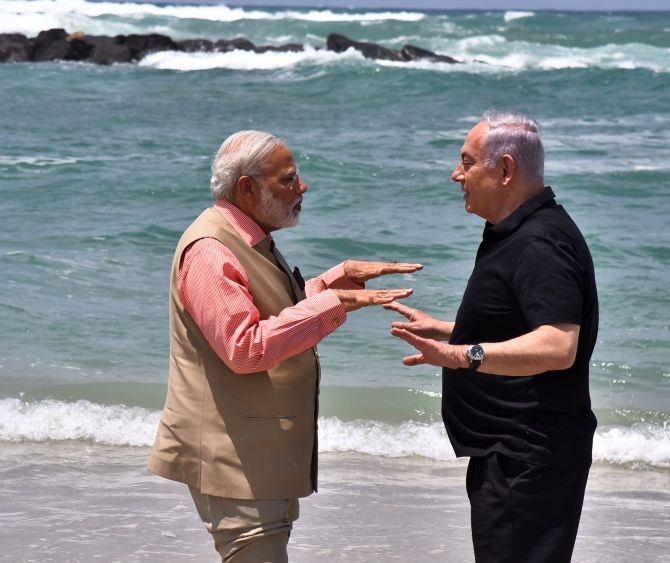 | « Back to article | Print this article |
'Christopher Hitchens asked which State Israel had most in common with -- and then answered his own question, saying "Pakistan".'
'They were both, he explained "confessional States": Founded to succour the followers of a particular faith,' remembers Mihir S Sharma.

Many years ago, I had lunch with Christopher Hitchens. It was an entertaining lunch, and given that I wasn't paying for it, I viewed his consumption of one-and-a-half bottles of wine during it with some equanimity.
Hitchens, as he did when faced with an appreciative (and young) audience, had become expansive; and, since this was before his turn to the right after 9/11 had solidified, his conversation and reminisces ranged well beyond his later obsession with Islam and Muslims.
He talked of many things: P G Wodehouse, George Orwell, the American fascination with Winston Churchill, the fate of the Old Bolsheviks under Stalin.
But what I remember most clearly were his remarks on Israel.
I felt a certain sympathy for Israelis and their State -- particularly its leftist, communitarian roots -- came through. But, in the end, he said that it would have to grow indeed to outlive its 'original sin'.
I thought he was speaking of the expulsion (flight?) of the Palestinians during Israel's war of independence; but, in fact, he had something else, more basic in mind.
He asked which State Israel had most in common with -- and then answered his own question, saying 'Pakistan'.
They were both, he explained 'confessional States': Founded to succour the followers of a particular faith.
Such States, he insisted, would never be able to truly embrace liberalism, however liberal many of their individual citizens might be.
Narendra Modi became the first Indian prime minister to visit Israel.
This trip is overdue; Our two countries have had diplomatic relations for 25 years, and our cooperation across sectors, if especially in defence, has only grown.
It is a little absurd that fear of a domestic political backlash has kept Indian leaders from visiting a country that is one of our stronger supporters, and Modi and his government deserve praise for breaking that long drought. No realist would think otherwise.
What's also interesting, however, is the source of the excitement within the ranks of the Hindu nationalist right, which idolises Modi.
For these men (mostly men, of course) seem to have a closer, more personal identification with the more extreme and exclusionary versions of Zionism.
For them, Israel is not just a country that 'threw out' its Muslims; it is the purest form of the religio-national, but modern, State that they aspire to turn India into.
It is not Israel's stubborn history that is central to their admiration; nor is the historical context as the last and final refuge for a people who were everywhere a persecuted minority.
These two may matter for admirers of Israel in the West and elsewhere, even those who are otherwise very liberal.
What matters to these men, however, is Israel's apparent muscularity, and that they see it as the enemy of their enemy.
What matters for them is exactly what other sympathisers of Israel deplore -- that country's decades-long drift to the right, the rise of streams of xenophobic nationalism in its politics, its exaltation of a defiant distant military past, even the resurrection of a sacred language as the language of everyday life.
They are not alone in their instincts.
For votaries of the new, hyper-nationalist world order everywhere, bilateral links are no longer driven by realist requirements, but by notions of common 'civilisational' traditions or priorities.
Speaking in Poland at almost the same time as Modi and Benjamin Netanyahu strolled along the Mediterranean, Donald Trump highlighted this search for civilisational links.
He finally endorsed Article 5 of Nato, which calls for a common defence; but he pivoted to a startling defence of the white, European Christian West as the writers of symphonies, the makers of innovation and the defenders of art.
This is a language familiar to white nationalists in the US -- but also to their counterparts in Eastern Europe, including some within Poland's ruling party.
And, yes, it is not uncommon in today's Russia, either.
Perhaps, the new nationalists are right, and such ties are indeed a stronger basis for international politics than such things as the idealism that underlay the Non-Aligned Movement or even the realism that is preferred by much of the traditional foreign policy establishment.
And some on the left, who hate liberal interventionism more than they hate right-wing ideology, seem to think that this new world order will lead to greater peace and less bombing.
Bashar al-Assad, who called Vladimir Putin the 'defender of Christian civilisation' after Russia's warplanes came to his aid, may not agree.
But either way, it must be a source of satisfaction for the Hindutva supporters who have long admired Israel not just to see their greatest hero visit the foreign country they most admire, but also to see that their notions of what should underlie alliances become so strong a challenger to the established thinking on the subject.
For me, however, I just remember Hitchens' words. A world such as they want would not, I suspect, create a hundred Israels.
It is more likely to create a hundred Pakistans -- including here at home.
IMAGE: Prime Minister Narendra Modi and Israel Prime Minister Benjamin Netanyahu on an Israeli beach, July 6, 2017.